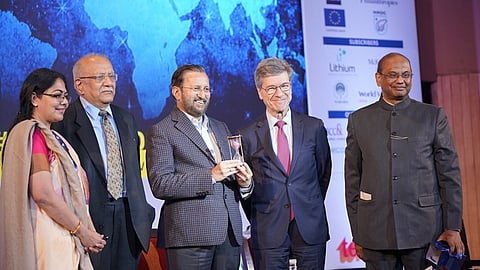WSDS 2020 focuses on making the decade count
Though the new decade is just a month old, some are already focusing on the year 2030, when countries have pledged to meet the United Nations Sustainable Development Goals (SDG). At the World Sustainable Development Summit 2020, hosted by The Energy and Resources Institute (TERI) in Delhi from January 29-31, experts and officials from around the world came together to examine and explore issues and solutions for viable global growth in the lead up to that deadline.
Spread out over three days, the summit covered a variety of topics. There were sessions on energy management solutions for SMEs, finance mechanisms for accelerating industry decarbonisation, addressing climate change through waste management initiatives and transformative actions to revive green climate finance. Speakers included eminent personalities such as Prakash Javadekar, Union Minister of Environment, Forest and Climate Change, Member of Parliament Jairam Ramesh, and Dharmendra Pradhan, Minister of Steel, Petroleum & Natural Gas.
In his inaugural address, Javadekar asked developed countries to assist developing nations with climate funding and knowledge. While urging the former to step up, Javadekar said, “Unless we address the main issues of finance and technology, we cannot achieve a just world order. We need an open-source approach for climate change innovation and should not profit while tackling a disaster.”
Jeffrey D. Sachs, a professor and director of the Center for Sustainable Development at Columbia University, was felicitated with the Sustainable Development Leadership Award 2020 for his contributions to the field. Sachs is also director of the UN Sustainable Development Solutions Network. In his acceptance speech, Sachs touched upon the recent Australian fires and current coronavirus breakout while warning that many parts of the world were coming closer to dire environmental crises. “Unfortunately, we’re stuck in politics rather than solutions, politics of the struggle for power kind rather than politics of the problem-solving kind. Until we move to politics of problem-solving we’re going to face ever-growing dangers in the world.” During a keynote address made on ‘Geopolitics of the SDGs and India’s Leadership in the World’, Sachs shared a 10-point agenda for an Indian global green deal, which included items such as “stop new fracking” and “shift to battery EVs by 2030.”
Electric vehicles featured in the Corporate Conclave: Mobility Talks segment of the summit as well. NITI Aayog CEO Amitabh Kant pushed for greater adoption of EVs and strengthening of public transport systems while reaffirming the national vision to move towards clean mobility. “Given its size and scale of growth potential, Indian industry must be the biggest driver of change to make us the centre of manufacturing of EVs. There are two challenges to address, to ensure a new form of urbanisation which is based on public transportation, and to ensure India doesn't lose out among global manufacturers of tomorrow," Kant said. He added that EVs should become cheaper than traditional cars within the next three years with the fall in the price of battery packs.
While releasing TERI’s report titled 'Towards a Low Carbon Steel Sector,' Minister of Steel Dharmendra Pradhan said, “The right mix of enablers is put in place to ensure that energy transition is secure, affordable, reliable, and sustainable. In our pursuit to end energy poverty in the country, we will remain cognizant of the need to route economic development firmly to achieve the 2030 UN Sustainable Development Goals and commitments made in COP21." According to the report, carbon dioxide emissions from India's steel sector could increase up to 837 million tonnes by 2050 if steel demand continues to grow.

